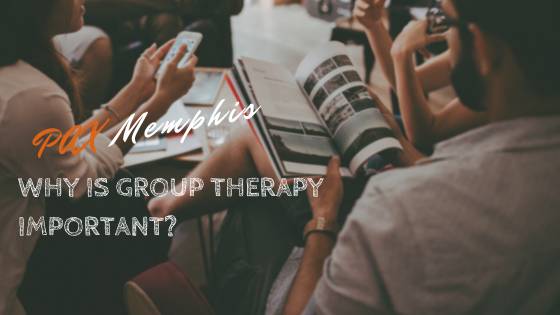Group therapy is one of many effective approaches to treating both mental illness and substance use disorders. Behavioral therapies play a vital role in treating these conditions and when held in group settings, it offers many benefits to patients. Today, it is standard practice to integrate group counseling into drug and alcohol rehab programs. In most rehab facilities, group therapy is an integral part of a patient’s comprehensive treatment plan. Whether a person suffers from a co-occurring disorder or only substance use disorder, he or she will benefit from group therapy.
What is Group Therapy for Addiction and Mental Health?
According to the Americal Psychological Association, “group therapy involves one or more psychologists who lead a group of roughly five to 15 patients…[group therapy] sessions are led by one or more psychologists with specialized training, who teach group members proven strategies for managing specific problems.”[1] These small groups consist of patients who experience similar hardships, such as addiction and co-occurring mental health conditions like depression, anxiety, PTSD, and more. Group therapy sessions are supervised and guided by a psychologist or licensed mental health counselor to ensure that the meetings are successful at meeting each participant’s needs.
Aside from addiction and mental health, group therapy is also useful in treating groups of people who have experienced loss, suffer from low-self esteem, have anger issues, marriage/relationship programs or are overcoming any kind of challenge or difficult time in life. Regardless of the issue, some goals that group therapy aims to achieve include:
- Help individuals identify and modify unhealthy behaviors
- Provide support and peer feedback among participants
- Bring together members with similar backgrounds, experiences, struggles, and goals
- Reduce feelings of isolation, loneliness, and alienation
- Allow members to learn from the experience of others
- Encourage friendships and the ability to share emotions freely
- Improve interpersonal communication skills
- Instill hope for recovery/long-term sobriety within the group
When it comes to sobriety, achieving these goals helps prevent relapse and promote feelings of community and belonging.
How Does Group Therapy Work?
Group therapy is held at both inpatient and outpatient treatment facilities. After all, it is an important component of addiction treatment, so it is used in all types of programs. This type of therapy serves as a sounding board and support network for all members. Although sessions are led by a therapist, most of the work comes from the participants. Participants take turns addressing and talking about problems or difficulties while relating to one another. Similarly, members of the group help each other come up with ways to cope with emotions, problem-solve, and improve difficult situations. All the while, members provide emotional support and accountability to one another along the way.
Confiding within other people helps individuals put their problems and worries into a healthy perspective. It comes as a relief to know that other people suffer from the same challenges. Furthermore, group therapy offers a safe setting for individuals to practice new behaviors and speak about new beliefs with other people – before applying these skills to the real world.
While many therapy sessions involve face-to-face behavioral therapy and dialogue, group therapy sometimes goes further. You may do trust-building activities, creative activities, and outdoor activities. These activities are used to build trust and a sense of safety while encouraging group participation. Without confidentiality, safety, and participation, the group’s effectiveness is questionable.
How Does it Support Recovery and Mental Health?
Psychoeducational group processing therapies provide important information about topics and conditions related to addiction that cause distress in life. Similarly, it addresses and provides insight into why these topics are concerning and how to fix them. Many people who have tried group therapy find it to be healing and significantly helpful in treating addiction and mental health. Some evidence-tested benefits of group therapy include:[2]
- Provide peer support, accountability, and pressure to abstain from drug or alcohol abuse
- Reduce sense of isolation in recovery and in people with mental illness
- Allow people to gain hope by witnessing others recover from addiction and become healthier
- Promotes healthy coping skills
- Allows people to learn from other members of the group
- Provides people with a safe place to gain feedback and advice
- Offer a family-like setting made up of like-minded individuals
- Encourage members to confront friends and loved ones about problematic behaviors
- Help participants prevent relapse and become stronger in their sobriety
Since group therapy provides valuable feedback and emotional support, it is a great fit for addiction and mental health treatment programs. Due to the many evidence-based benefits of group sessions, it is a staple at nearly every addiction treatment center out there. For years it has helped patients in both inpatient and outpatient rehab programs.
If you or a loved one is suffering from addiction or mental illness, contact our addiction specialists at PAX Memphis to learn more about our group therapy programs.
References:
Medically Reviewed: September 25, 2019

All of the information on this page has been reviewed and verified by a certified addiction professional.










